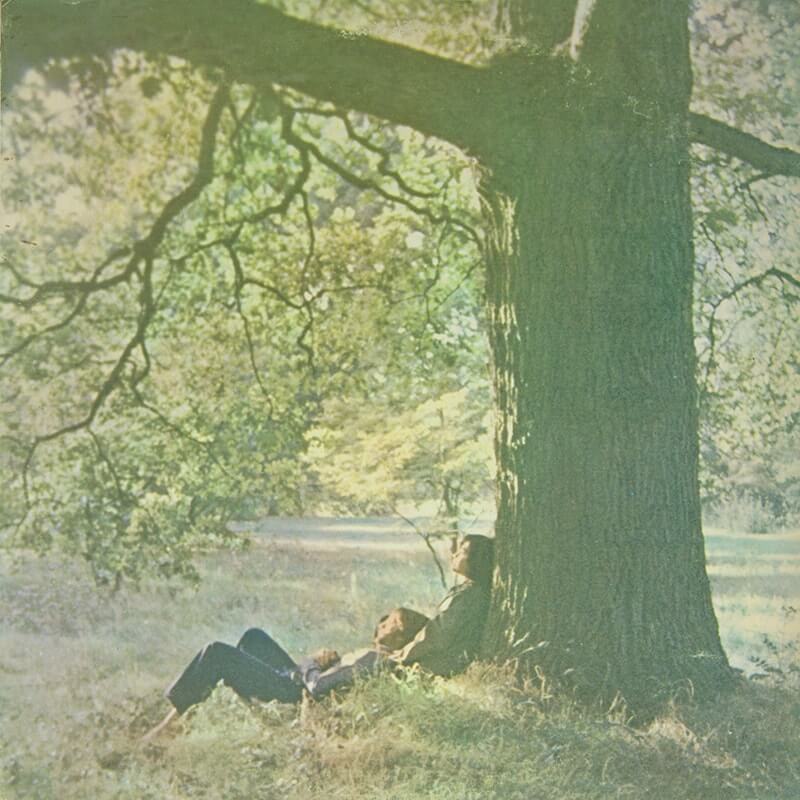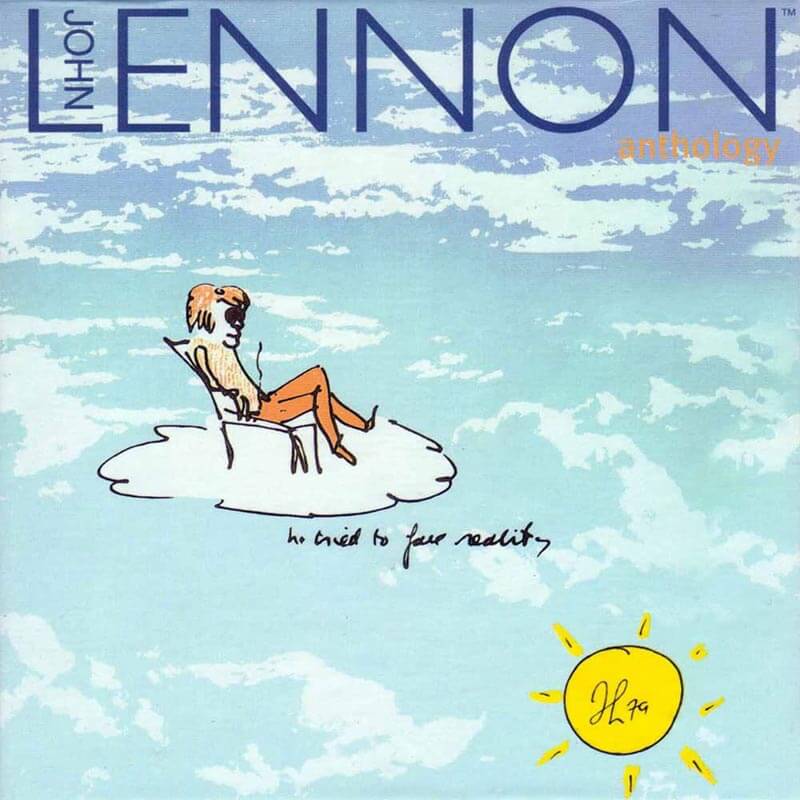Loading...
John Lennon/Plastic Ono Band
‘God is a concept by which we measure our pain.’
– John Lennon, 1970
John Lennon Plastic Ono Band
Produced by John and Yoko and Phil Spector
Track Listing
- 5:36
- 1:52
- 3:38
- 3:47
- 2:52
- 4:32
- 3:22
- 5:57
- 2:53
- 4:12
- 0:51

John Lennon’s first solo album was far from being his first work outside of the Beatles. To widespread bewilderment, he and Yoko Ono had already released three avant-garde recordings (Two Virgins, Life With The Lions and Wedding Album). And with the Plastic Ono Band the couple had made the in-concert rock album Live Peace In Toronto 1969.
John had even achieved three massive hit singles: ‘Give Peace A Chance’, ‘Cold Turkey’ and ‘Instant Karma! (We All Shine On)’. All were done with scarcely a fellow “Fab” in sight.

What intensified interest in John Lennon/Plastic Ono Band, though, was that it was his first post-Beatles album. By its release date in December 1970, the old group had been officially defunct for several months, and John’s actual participation had ceased a year ago. It took people a long time to grasp that The Beatles were finished. But at this moment in 1970, John Lennon himself was in no doubt. That dream really was over.
Conditioned by the mighty impact of each successive Beatles release, fans still expected big things of the four solo acts. Not even Let It Be, that slightly underwhelming finale, could dampen anticipation. And Lennon was ready for the challenge. If people were expecting tablets of stone from the mountain, well, he’d damned well have a go. Liberating as those experimental albums with Yoko had been, he was still a rock star who saw his rightful home as high in the sales charts. The new album, John Lennon/Plastic Ono Band, was to be both a powerful statement and a mainstream event.



John Lennon playing guitar, 1971 Photo by Yoko Ono ©1971 Yoko Ono
John & Yoko, 1970 Photo by Ray Connolly ©1970 Yoko Ono
John & Yoko, 1970 Photo by Ray Connolly ©1970 Yoko Ono
As if unwilling to entirely shed the protective shield of a group identity, John put “Plastic Ono Band” in his album’s title – even if they were more a concept than a fixed line-up. Its cover art, though, shows only two individuals: himself and Yoko, deep in woodland peace, sporting the cropped hairstyles they had half symbolically adopted in the dying hours of the 1960s. Yoko herself released a companion album, with similar packaging, as Yoko Ono/Plastic Ono Band. In practice, they thought of these as untitled records. John referred to his by its opening song ‘Mother’, and Yoko by her corresponding track ‘Why’.


John Lennon/Plastic Ono Band & Yoko Ono/Plastic Ono Band album covers Photos by Dan Richter ©1970 Yoko Ono
However we name it, John’s album is one of the boldest acts in rock history. Like the other Beatles, like Bob Dylan and Jimi Hendrix, he was from a cohort who saw no disconnect between artistic adventure and commercial ambition. He’d just spent seven years creating the biggest pop hits ever, usually with outrageously innovative sounds. This time around, his bravado was more confessional than sonic. Though simpler in its execution, the effect of John Lennon/Plastic Ono Band is still as jaw-dropping as, say, ‘A Day In The Life’ or ‘Strawberry Fields Forever’.
Yet John’s approach to this revolutionary album was almost conservative. Apart from his beloved Yoko he chose for his team the trusted drummer of his last act, Ringo Starr, and on bass an old comrade from the far-off Hamburg days, Klaus Voormann. Another long-standing friend, Billy Preston, would add piano, as he had done on ‘Get Back’. And all around was the familiarity of EMI’s Studios at Abbey Road, in London. Even the choice of Phil Spector as co-producer was an organic development from the final days of The Beatles – the American had come to England earlier in 1970 for his controversial completion of the Let It Be tapes, and stuck around to help with John’s powerhouse single ‘Instant Karma! (We All Shine On)’.
If Spector was legendary for his massive, all-out studio style – and, at least in Paul McCartney’s eyes, had taken it to excess on Let It Be – here he was content to leave the songs as brutally unadorned as John might wish. John Lennon/Plastic Ono Band is not the bleak record of some descriptions, for there are some beautiful melodies and gently beguiling arrangements. But the stark purity of the songs is always paramount.
‘Phil Spector came in much later, actually,’ explains Yoko Ono. ‘We made most of it by ourselves. If he, Phil, had done it from the beginning I am sure it would have been a totally different album, lush, walls of sound. John Lennon/Plastic Ono Band is a strip down of John’s soul.’
The catalyst here was Dr. Arthur Janov, an American psychotherapist becoming known for his new book The Primal Scream. A copy had found its way to John, who proved the most receptive audience. With hindsight it’s little wonder. Standout Lennon songs of the previous two years – think of ‘Yer Blues’, ‘Julia’. ‘I Want You (She’s So Heavy)’, ‘Cold Turkey’ – indicate a writer who had exchanged psychedelic word-play for unsparing self-examination, punctuated with howls of desperation. It was Janov’s contention that we escape our psychic pain by uncovering the scars of childhood. John Lennon was practically signed up already.
However, nothing about the Lennons’ chaotic lives that year left time for leisurely courses in self-discovery, and their sessions with Dr. Janov (in California and in England) were brief. Fortunately, John was sufficiently energised to pour his thoughts into song.
Consider his position. The child, says an old aphorism, is father to the man, and the record’s back sleeve would carry a grainy snap of that lost Liverpool schoolboy. In 1970 the 29-year-old orphan (for he considered his father as ‘dead’ to him as Julia, his mother) was for the moment without anchor in any political or spiritual creed. And he had just walked out of the biggest band in history. The moment was at hand to make a purgative reconnaissance of his own soul.
‘Mother’, with its funereal bell, opens the album on a note of solemn introspection, building to an authentically “Primal Scream” climax of abandonment. At record’s end, the scratchy coda ‘My Mummy’s Dead’ sounds like a ghostly transmission from the 1950s teenage bedroom in Menlove Avenue; we can visit that room today and see, as Yoko says, that ‘his childhood bedroom was so tiny but what a big dream it must have contained.’


John Lennon & Yoko Ono at a promotional event for their Plastic Ono Band albums, 1970 Photographer unknown ©1970 Yoko Ono
John Lennon & Yoko Ono at a promotional event for their Plastic Ono Band albums, 1970 Photographer unknown ©1970 Yoko Ono
The album shows songs of the simplest intimacy and the grandest vision. If ‘Working Class Hero’ is too steeped in honest ambiguities to become the populist anthem John once hoped, then ‘God’ is perhaps the clearest statement he ever made in song – a majestic abdication from the post of false prophet that he had never sought.
On release, John Lennon/Plastic Ono Band confused everyone. There were no inviting radio tunes, no hit singles or communal sing-a-longs. Some listeners sensed that Lennon had made the most powerful record of his life, but it defied you to engage on a superficial level. Nothing has changed. These remain songs that ask for our full engagement – and they reward it, deeply. If certain dreams were over, new dreams were stirring. They might even come true, if we only had the power to… Well, the power to imagine. John Lennon’s career was about to enter its extraordinary second act…























